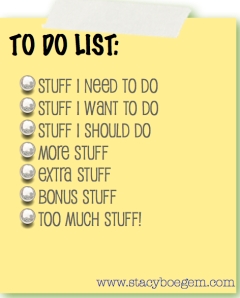Is this what your to-do list looks like? Mine does. My responsibilities are largely in support of other teams or persons. As a result my to-do list is determined by the priorities of others. I doubt this is unique to me. The “stuff” I want to do is much lower on the priority list.
When I start my day I prioritize one thing that I really want to get done. I don’t mean getting a latte or talking with colleagues about fantasy baseball. I’m talking about a side project or project that means a lot to me. Often it is a project that I have neglected and need to focus on and get it off my list. I make it a priority to get something done on that project.
On days where most of my time is devoted to serving others’ needs and priorities this is a nice way to break up my day. I also use this time to address issues that are not getting attention. Since they don’t have deadlines there are no expectations, timelines, or deliverables. I can allocate 30 minutes out of my day on such a project without disrupting or delaying my other responsibilities. This is where innovation comes from. I’m not saying any of my priorities represent innovation, but the freedom to work at my own pace enables me to be more objective.
Spending time of a side project also helps my morale. I’m a self-starter who enjoys identifying and resolving problems. Finding and resolving an issue makes my day more satisfying and improves my performance on the to-do items that are in service to others.



